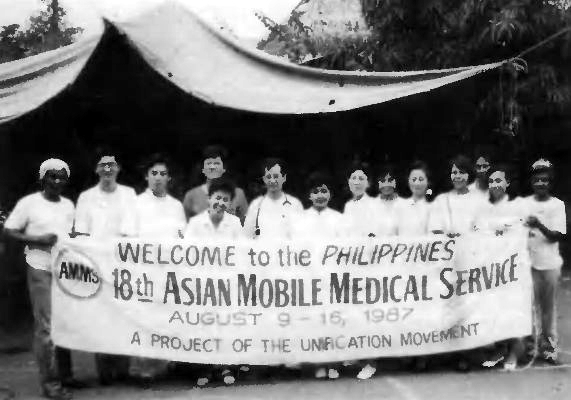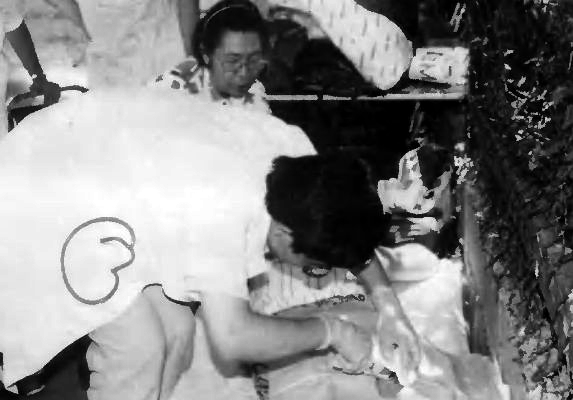![]()
The Words of the Guh Family
|
|
The Words of the Guh Family |

Some
of the AMMS medical staff working in Manila.
Dr. Cherng Jacob Guh, a church member since 1974, has been serving as an obstetrician / gynecologist since 1982 in Taiwan, Republic of China. From August 9-16, 1987, he attended the 18th Asian Mobile Medical Service project, held this year in the Philippines. This was his third time participating in AMMS. A volunteer medical team connected to Isshin Hospital in Japan, AMMS provides free medical care to impoverished people in various countries.
I had not thought it would be possible for me to be a part of another project of the Asian Mobile Medical Service in the Philippines. But thanks to Dr. Michiko Kozaki, president of AMMS, and
Dr. Hiroshi Shiraishi, the secretary-general, I was invited to participate once again, and it proved to be one of my most memorable times of serving and sharing.
The Philippines, a nation made up of 7,083 islands, is the nearest country to Taiwan. It takes only one hour and 50 minutes to fly from Taipei to Manila. Since June of 1987, our movement in the Philippines has sponsored several projects that have been attended by Chinese members and professors from Taiwan: a 40-day workshop, a Unification Thought seminar, and the International Congress of PWPA. The Philippine members have been working very hard for the sake of the providence in all of South Asia.
The Philippines is the only Catholic country in Asia. Many churches can be seen in every big city and small town. God loves this country very much, but she has been tested severely in the past years. I believe that if Filipinos can unite together even amidst their suffering and trials, this country will be able to truly receive God's blessing.
This is the fourth time that AMMS has sponsored a medical service project in the Philippines, and when I went there this time, I saw that many Philippine people were still in desperate need of medical services. The situation of the poor seemed to be little changed from what I saw two years ago. Since the February 1986 revolution, the economic condition has not improved very much, in spite of a much freer political atmosphere.
There was still evidence of a big gap between the rich and the poor. We could see many men who had no work idling in the streets. Others were working, but only at primitive types of labor. We had come to this country to help fight against illness, and in our hearts was the hope that one day the rich would give to the poor and the wise would teach the ignorant, so that poverty and ignorance might not give communism a way to invade.
I was shocked when I saw the pool fishing village of Cavite, southwest c Manila. Villagers' "houses" were built only of straw and palm fibers, standing on the muddy marshes. When we were doing our medical service there many emaciated children came with sorrowful eyes and bulging bellies, flies hovering over ulcerated wounds on their heads and faces. It reminded me of scenes I had seen on TV of starving African refugees. To see such misery has been the most painful experience for me. How can people remain aloof to this suffering, like the Levite and the priest in the story of the good Samaritan (Lk 10:30-37)?
In the downtown area of the city, not very far away, there are many modern buildings and people driving fancy cars. The rich still enjoy their luxurious way of life.
It shocked me even more to see the inside of the Malacanang Palace, where former president Ferdinand Marcos and his family had lived for 20 years. It is now a national museum. Seeing the thousands of suits, shoes, and dresses in the closets, including one opulent set of king's and queen's clothing, I understood how human desire for physical things can become so overwhelming that no amount of material wealth can satisfy it.

Dr.
Cherng Jacob Guh doing a minor operation on a patient in one of the
temporary clinics.
So how could we help the poor people of the Philippines? They desperately needed our love and service, so we came to offer them medical help. We knew we weren't going to give them medicine only, but also love. It was because we were motivated by God's love that we could offer such unconditional service, without thinking of ourselves. Although what we could give them was very little, their appreciation was immeasurable; many times the people we treated for even minor ailments were moved to tears of gratitude. How beautiful it is when people love and express their hearts to each other like this! I understood deeply that true brotherhood goes beyond barriers of race, nationality, language, and culture.
During a four-day period, the 53 medical staff members from six countries served 5,267 patients in 15 locations all over the country. Team I went to the south -- to Cebu Island, Davao, and Bacolod; Teams II and III went to the central part of the country -- to Cavite, Bulacan, Caloocan, and a district of Manila; and Team IV went to the northeastern part of Luzon Island. Everyone worked very hard. The Team I members had to get up at 3:00 am every day for another plane ride to the next service area. I saw that Dr. Shiraishi exuded heavenly grace, even as he got skinnier and darker every day. And Mrs. Suh, a 36 Blessed Couple, always smiled warmly in spite of the incredibly hard work. Team I brought back from the south a most special famous fruit called lio-lion to share with all members at the main training center in Manila.
There was a water shortage at the training center where my team was staying: we could use running water only every other day. Sometimes we had to take a bath with only one bowl of stored water each. Some of us on the medical staff even became sick! We all worked late and slept little. Even though they were very tired, the dental technicians worked until midnight to finish making dentures for the patients they had served that day. Every evening we attended an evaluation meeting to reflect on our work and to plan better ways to accomplish the next day's service. We tried to serve the sick people as if we were their parents; thus we were constantly learning the lessons of love, Only God's love could have enabled us to practice such love, service, and sacrifice.
During our stay, we felt God's love strongly through the unity of all the medical staff. We deeply appreciated the Unification Church members' care for us; they served us food as if they were serving True Parents. And one day after our work, we were entertained with many lovely songs at a congressman's house. On another day, at the Caloocan City Hall, the city band gave us an elegant, triumphant welcome with beautiful love songs.
Our Farewell Banquet on August 15 was attended by the Vice-President of the Philippines, Salvador Laurel, who gratefully acknowledged us with the words, "The Filipino people can take heart in knowing that they are under the watchful care of socially-oriented organizations that reach out to those in need of medical and dental service!"
I want to express deep appreciation to Mr. Toshinobu Murotani, the director of the Unification Church in the Philippines, to Dr. René Santos, the chairman of the Board of Advisors for AMMS, and to all the Unification Church members, the Philippine doctors, and the representatives of the government who supported us. Without their help and their organizing ability, we could have done nothing.
For the sake of God, for the sake of the security of Asia, and for the sake of the Philippines, we heartily pray that God may bless this country and every one of its people, from its most renowned to its most humble citizen.